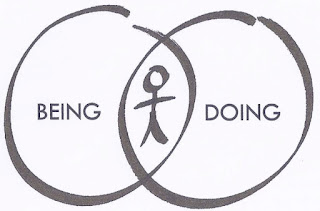The End is the Beginning
Gaudete (Rejoice) Sunday is the third Sunday
of the Advent Season. It is a Sunday of transition in the season as the
liturgical color changes for the week from violet to rose and the focus changes from looking
forward to the Second Coming of Jesus to preparing to celebrate his first
coming. Before moving on to the second half of Advent, I wanted to take a
moment to reflect on the first two weeks of the season.
Advent is a time when we remember the
Incarnation and prepare to celebrate Christmas, but it is also a time to
remember that Christ will come again. The readings in the mass
for the first two
weeks focus our attention on our mortality, the return of Jesus, and the
Kingdom to come. I attended two different parishes during the first two weeks
of Advent. Both Sundays the priest’s homily was rightly focused on these themes
of remembering our end, and the end of the world. Both homilies were very good,
yet both priests approached the idea of the end of our lives and the end of
this world with hesitation. They commented how we all want to go to heaven, but
no one is in a rush to get there. That got me thinking.
All of us want to live a long, healthy life.
We want to see our children grow up, and see our grandchildren. No one likes to
think or talk about death. Although there’s certainly nothing wrong with this,
shouldn’t we desire heaven and the return of Jesus more fervently than we do? When
you read the New Testament epistles and even the Book of Revelation there is an
excitement and eagerness for the Lord’s return. In fact, the bible ends with
the prayerful exclamation “Maranatha!” meaning “Come Lord Jesus!”
The early church was almost impatient for the
Lord to return. Today, most of us would rather he wait.
Some consider hoping for Christ’s immanent return
to be a form of escapism for those overwhelmed with the burdens of life, fearful
of the state of the world, or overcome by rapid, unsettling cultural changes. To
be sure, there are those who do have this mindset. In fact, the entire theology
of the rapture—a predominantly nineteenth century Protestant doctrinal
invention—is formed around this idea of escaping from the world. But this idea
of escapism is much different than the hopeful expectation of the early church.
The early Christians longed for Christ’s
return because they knew the end was only the beginning. They knew that we were
not made for this earth, but to spend eternity with God. They recognized that
no matter what treasures, fame, or wealth this world has to offer is ultimately
“garbage” (Phil. 3:8), that all of the pain, suffering, and trials we face only
prepare us for an “eternal weight of glory” (2 Cor. 4:17). The early Christians
sought the end of this world because it meant being with Jesus and living in the
presence of God. They weren’t looking to escape; they recognized that this life
is a really long road trip and they just wanted to get home.
I used to have a card that I carried in my
wallet with a simple phrase on it, “Live each day as if Jesus died yesterday,
rose today, and is coming back tomorrow.” I have to confess, I don’t always
follow that advice, but what would my life look like if I did? This doesn’t
mean quit your job, stop paying your bills, and sit on a mountain top waiting
for Jesus. It does mean, think about your choices and priorities. There is
another saying similar to this (but it sounds cooler because it’s Latin), “Tempus
fugit. Memento mori.” It means, “Time flies, remember your death.” It is a call
to consider how I live my life.
My kids love watching “Man vs Wild”, a survival
show where the host, Bear Grylls, is dropped off in some remote location and he
demonstrates survival techniques. Most often, one of the first things he does
is look for a high point to look out and gain a lay of the land. He’ll get his
bearings, figure out what direction to travel, and pick some landmark in the
distance. I know from my own days in scouting that when you’re hiking in the
wild it’s always best to set a fixed landmark, because once you start walking
and you have to navigate terrain or push through heavy growth, it’s easy to get
turned around and lost in the trees. But, as long as you’re able to realign
with the distant landmark you will know where you’re going.
This is what the author of the Letter to the Hebrews
means when he writes that we should fix “our eyes on Jesus, the pioneer and
perfecter of faith. For the joy set before him he endured the cross, scorning
its shame, and sat down at the right hand of the throne of God.” Jesus endured
it all because he had the end in mind. We need to constantly remember, not just
during Advent, that there is an end. We should long to get there, while faithfully
enduring until we do. Like anyone running a marathon, then finish line should
be something we long to see and eagerly anticipate, not fear or avoid. Our hope
is in Christ and he is the one leading us home. He has prepared a place for us
(John 14:3). Like the early Christians let that knowledge excite us. Let us
look forward to heaven like we look forward to sleeping in our own bed after a
long road trip. Let us fill our hearts with the joyful cry, “Maranatha! Come
Lord Jesus!”



Comments